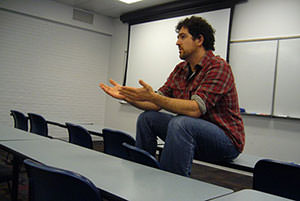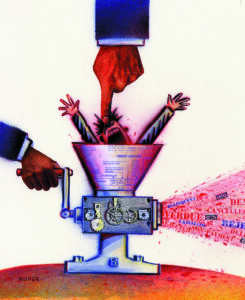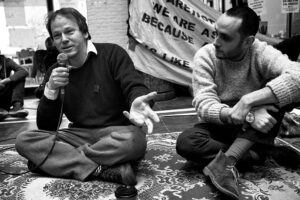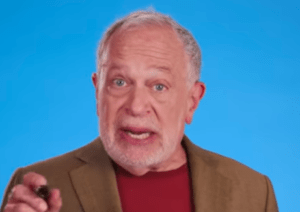A Warning to the Next Generation of Student Debtors
Explaining why she is fighting for reform of the student lending industry, Carmen Berkley bursts into tears. She is one of several borrowers interviewed in a documentary by Serge Bakalian, above.
Explaining why she works with the United States Student Association in fighting for reform of the student lending industry, Carmen Berkley bursts into tears.
“I just don’t want anyone to have to go through what I have to go through,” she says, speaking of being hounded by lenders and having tens of thousands of dollars in debt she feels she can never repay.
Berkley is one of several borrowers interviewed in “Default: The Student Loan Documentary.” Another is Matt, who also tears up when he talks about his situation. A former student at New York University Film School, he says that with his debt reaching $200,000 he doesn’t think he will ever be financially able to marry and have children.
Aurora Meneghello, who made the short documentary with Serge Bakalian, said audiences respond to this moment in particular. “The human consequences — the amount of debt that never goes away, that destroys people’s credit and makes it impossible sometimes to have a family — that resonates a lot with people,” she said. “Basic human rights are taken away from you because you cannot pay back money you borrowed.”
Experts such as Anya Kamenetz, author of “Generation Debt,” and Alan Collinge, who started StudentLoanJustice.org, also appear in the film, but filmmakers Bakalian and Meneghello purposely kept the emphasis on regular borrowers.
The borrowers tell stories about how their debt ballooned when, amid climbing interest rates, they went into forbearance (being charged for suspending payment) and how student loans are treated differently from other loans — they aren’t forgiven when one declares bankruptcy, for example.
Some of the borrowers who have become activists detail what they are doing to fight the student lending industry’s power over Congress, and they encourage others to join them.
That’s important, Bakalian said. He and Meneghello are showing “Default” on college campuses and at conferences around the country, and after the screenings audience members often ask how they can get involved.
“One of the things we really wanted to do with the film besides presenting a human face to the issue was we didn’t want people to watch this film and get depressed,” he said. “We wanted them to leave the theater engaged and wanting to act, in whatever capacity.”
“Default,” which has been broadcast on PBS and Link TV, came about as a result of Meneghello’s own struggles with student loans. She told her friend, Bakalian, and he had the idea to make a movie. The issue is now getting a lot of attention, with student loan debt at about a trillion dollars, surpassing credit card debt, and the average borrower owing more than $20,000 when he or she leaves school. But when the filmmakers started doing research, they said, most of the information on student loans was positive, and there was very little on what would happen if borrowers couldn’t make their payments.
“We wanted to explain that people weren’t able to pay back their loans not because they weren’t able to pay back what they borrowed, but because they’re [having] to pay multiples of what they borrowed,” Meneghello said. “Essentially if you make a mistake and go into default, for whatever reason, it’s very hard to dig yourself out of that situation. There is no safety net for people who can’t pay.”
One of the activists interviewed in the film is Robert Applebaum, who went into forbearance when, on a yearly salary of $36,000 as an assistant district attorney in Brooklyn, he couldn’t deal with both his rent and his law school loan payments.
On Jan. 29, 2009, nine days after President Barack Obama was inaugurated, Applebaum wrote an essay on Facebook suggesting that student loan debt be forgiven to stimulate the economy. He says he was frustrated by Obama’s stimulus package, which relied heavily on tax cuts. Applebaum says that if he didn’t have to pay $500 a month for loans, he would be spending that money going out, traveling, maybe putting a down payment on a house. And there are hundreds of thousands of others like him, he adds.
“This seemed like a good bottom-up approach for economic stimulus,” he said. “If we’re going to dig ourselves out of hole we’re in, we need to do it by spending — that is how the economy works. It’s the same principle as tax cuts to put money into people’s hands, but way more equitable and smarter.”
Applebaum’s essay got a lot of attention, and when U.S. Rep. Hansen Clarke of Michigan wrote the proposed Student Loan Forgiveness Act of 2012 he contacted Applebaum to work with him, which Applebaum called “a dream come true for a political science nerd like me.” The bill states that if you pay for 10 years at 10 percent of your discretionary income, your loan will be forgiven.
Applebaum, like filmmakers Bakalian and Meneghello, maintains that everyone, whether or not saddled with a student loan, feels the effect of the student loan crisis: Younger people don’t invest or start businesses or buy houses or go into the professions they want, and the economy stagnates.
Applebaum considers “Default” a great way to start conversations about what is happening.
“I would like to see that movie played in every high school classroom in America,” he said. “There needs to be an education campaign waged at those contemplating taking out these loans.”
Your support matters…Independent journalism is under threat and overshadowed by heavily funded mainstream media.
You can help level the playing field. Become a member.
Your tax-deductible contribution keeps us digging beneath the headlines to give you thought-provoking, investigative reporting and analysis that unearths what's really happening- without compromise.
Give today to support our courageous, independent journalists.






You need to be a supporter to comment.
There are currently no responses to this article.
Be the first to respond.